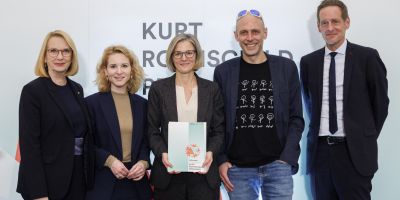Raising the ceiling on diversity and inclusion with Marks and Spencer

Academics from the Universities of Leeds, Durham and Birmingham are working on a new collaborative research project with University of Leeds corporate partner, Marks and Spencer (M&S).
To celebrate National Inclusion Week 2017, the University of Leeds is hosting an event on 29th September as part of the collaborative On Your Marks Networking Series, delivered annually in partnership with M&S. Simmone Haywood, M&S Head of Talent and Professor Cathy Cassell, Dean of Birmingham University Business School will address an audience of business and academic leaders with an interest in diversity and inclusion in the workplace.
The three-year research project, which started in January this year, aims to understand and improve our knowledge of the effective and successful implementation of diversity and inclusion strategies in the retail sector and in organisations more broadly.
Dr Kathryn Watson, Principal Investigator said, ‘We are working in partnership with M&S to identify ways in which the company can build on its existing strong organisational culture to ensure an inclusive business environment that enables all individuals to perform to their maximum potential and deliver excellent customer service’.
Using a case study approach focusing on the leading retailer, the team are investigating diversity and inclusion in relation to a number of Human Resource issues: retention and inclusivity, career success, progression and development and the intersectionality of protected characteristics under UK legislation (The Equality Act, 2010).
The impetus for the project, which is funded by the Economic & Social Research Council (ESRC), came from a small pilot project carried out by Professor Jackie Ford, and Drs Kathryn Watson and Paula Burkinshaw in 2014. The former M&S Chairman, Robert Swannell, had signed up to the 30% Club, a voluntary association with the aim of getting at least 30% women on the Boards of Directors of FTSE-100 companies and the initial research focussed on gender diversity. Since this time, the business built on its commitment to promoting diversity and inclusion in all its forms and this current, larger ESRC-supported project has broadened the remit of the initiative to include all diversity parameters to include ethnicity, age, race, disability, religion and sexual orientation as well as gender.
M&S has effectively opened its doors for the research team to engage closely with staff and explore in detail many of the processes and practices within the company. It is a rare opportunity for academic researchers to be granted this level of access within a business organisation. The project team make regular feedback reports and discuss the findings which are given high level strategic consideration. M&S colleagues are involved in planning each subsequent stage of the research.
M&S is a global brand with over 80,000 employees. The collaboration reflects the business’s commitment to demonstrate best practice in employment throughout the company and to support broader dissemination to the retail sector and other large employee organisations. The project includes a planned series of public dissemination events from 2018 onwards. These events will be supported by M&S participation.
The research team includes Professor Cathy Cassell (Birmingham), Professor Jackie Ford (Durham), Dr Kathryn Watson, Project Principal Investigator (Leeds), Dr Kyle Griffith (Leeds), Dr Karen Da Silva (Leeds) and Dr Usman Aslam (Birmingham). From the M&S side, the project is supported by Simmone Haywood, Head of Talent, Claire Maydew, Diversity and Inclusion Manager, and Tamsin Slade, Relationship Manager.
Simmone Haywood commented ‘Marks and Spencer is committed to enhancing opportunities for all our employees and developing talent within our teams. We believe that diversity and talent go hand-in-hand to ensure effective decision making, high performing and innovative teams and to deliver meaningful careers and opportunities. We want to celebrate all aspects of diversity in our business and so we are delighted that this project with the University of Leeds and academic partners will support us to do this.’
Professor Cathy Cassell welcomed the close industry-academic collaboration and said ‘Diversity and inclusion is not something purely within the remit of HR, and having good policies and documents is usually not enough to implement a good diversity strategy. At the heart of diversity and inclusion is the commitment of employees at all levels and an organisational culture that embraces the differences within its workforce, as well as providing good support systems where needed. This research is a very exciting opportunity for us as researchers that will not only benefit M&S but many other UK businesses and employer organisations.
The University of Leeds is proud of its unique partnership with M&S, which was founded on the relocation of the M&S Company Archive to the Leeds campus in 2012. The partnership represents a new model of engagement between industry and academia, based on mutual value creation around the key themes of Research and Innovation, Student Education and Opportunity, and shared ways of working.
Professor Jackie Ford, who has widely published on leadership and diversity issues, commented ‘Much of the academic literature on diversity focuses on the negative effects of inequality or on making the business and moral case for adopting diversity policies. While this has been a worthy focus, what is lacking is a clear understanding of the processes involved in bringing about a major programme of organisational change in a large organisation and understanding what it is that makes diversity policies actually work.
This research aims to make a major contribution to academic knowledge as well as being of practical relevance to businesses.’
Details of the ESRC funded research grant:
The project commenced 1st January 2017 and is for three years. The total funding is nearly £900,000 with approximately two-thirds of this provided by the ESRC.
Grant Title: Raising the Ceiling on Diversity and Inclusion: A Corporate Retail Case Study
Grant Amount: ££527,578 (ESRC contribution); £649,205 at Full Economic Cost
Grant Reference: ES/N018710/1




